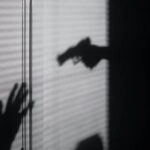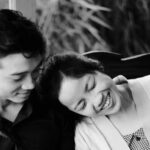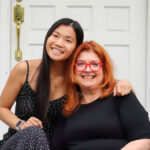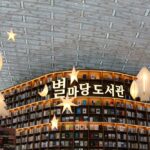
While Korean horror flicks have successfully creeped out audiences worldwide, Korean horror books may be lesser known. For those of us who appreciate a good fright, here are four books by Korean authors that will keep you up at night.
The Vegetarian by Han Kang (trans. Deborah Smith)
So you’d like to be true to yourself? Beware of the consequences. Representing the maddening, frightening repercussions that result from a clash between conformism and individual agency, Han Kang’s The Vegetarian is a short novel that unflinchingly follows the brutal effects that an act of defiance has on one woman and those around her.
When Young-Hye has a gory dream about violently killing and eating animals, she decides to become a vegetarian. This choice disrupts her otherwise ordinary—and stifling—life, and her deviation from the dietary norm marks her as a target for social derision and discipline. She does, however, remain stubborn, even as her family attempts to forcefully coerce her into becoming a compliant meat eater once again. As Young-Hye endures the misunderstandings and abuse of those closest to her, her grasp on reality slips away from her, and fantasies about becoming a plant consume her mind.
Han Kang and translator Deborah Smith won the Man Booker International Prize 2016 for The Vegetarian. Told in three parts, in the perspectives of Young-Hye’s husband, her brother-in-law, and her sister, Han’s novel provides readers with a multifaceted view of Young-Hye that nevertheless omits her very voice. While her utter isolation and ostracism are reflected through her speechlessness, her actions rendered through Han’s vivid language and imagery manage to speak quite loudly and echo beyond the suffering she endures.
The Vegetarian would be a great book for readers looking for some creepy moments sprinkled into a literary work that explores human cruelty.
Flowers of Mold by Ha Seong-nan (trans. Janet Hong)
Like a fog slowly thickening around you, Flowers of Mold will wrap you in its chilly atmosphere and lure you into its depths until you realize that, although you’re pretty sure you’re alone, you have goose bumps, you’re clenching your teeth, and you’re not quite sure where you are anymore. Flowers of Mold will have you looking at your quotidian experiences and encounters and second-guessing whether they’re truly as straightforward as seem.
Ha Seong-nan’s book is a collection of ten dreamlike short stories in which everyday situations lead to unsettling or disturbing conclusions. In some stories, mundane events—like the lending of a spatula to a new neighbor or the potential eviction of a group of commercial tenants—quickly lose their thin sheens of normalcy, exposing the elements of psychological distress and paranoia that were just barely hidden before. In other stories, readers are invited to observe creepy, upsetting behaviors like a man obsessively digging through a woman’s thrown-out trash or parents gaslighting a daughter who insists she’s been assaulted. Driven by our suspicions that modern life has covered up what lurks in the shadows with flimsy screens of artificiality and tedium, Ha’s stories play with how we—and those around us—construct and warp our fragile perceptions of reality.
Ha is an award-winning author whose acute awareness of the strangeness of our private thoughts and behaviors—even in the most seemingly normal of us—is at work in this book. Subtle and tricky, her surreal atmospheres toe the line between dream and reality, ultimately raising the question of how can we ever really know how to find the line at all.
As a collection of short stories, Flowers of Mold allows readers to experience a variety of harrowing scenarios without having to commit to a single, longer narrative. This is a book that’s perfect for transforming that shadow in the corner of your eye into a fleeting specter.
The Good Son by You-Jeong Jeong (trans. Chi-Young Kim)
Mining the murky depths of mistrust and unreliability, You-Jeong Jeong’s The Good Son plunges into the damaged inner world of a psychopath. In this blood-spattered novel, psychological traumas join with graphic descriptions of violence to propel the narrative while providing insights into what has happened and why.
Yu-jin, a bright twenty-six-year-old hoping to attend law school, wakes up one morning covered in blood. Following the blood through his home to the source, he traces it to the corpse of his murdered mother. Yu-jin has epilepsy and a faulty memory, so when he tries to remember the night before, he can only vaguely recall his mother calling his name, and not much else. As Yu-jin scrambles to piece together his past, he learns about who he is, how he relates to his family, and ultimately, what he is capable of.
The Good Son is one of those books that grabs you and doesn’t let go. While it starts off with a now well-defined premise, Jeong offers plenty of genre innovation to keep readers guessing as the novel unveils its electric revelations. Furthermore, Jeong’s thriller offers more than just an adrenaline-pumping gaze into unhinged terror; The Good Son is also a nuanced study of family dysfunction, offering readers fragmentary clues about Yu-jin’s family that come together like a twisted puzzle.
The Good Son would be an absorbing read for fans of crime fiction, lovers of thrillers, and readers looking for a psychologically savvy story full of shocks to keep them on their toes as they addictively turn the pages.
The Hole by Hye-young Pyun (trans. Sora Kim-Russell)
Imagine what it’s like to be able to observe everything that’s happening around you and to you, all while not being able to do a single thing about it—not even scream. In Hye-young Pyun’s novel The Hole, readers are invited to confront the nightmarish despair of losing control of one’s body and life.
After a car accident kills Oghi’s wife and renders Oghi himself unable to move or even speak, he is left in the care of his mother-in-law who is bereft by her daughter’s death. Helpless and confined to his bed, Oghi, in his forties, passes the hours remembering his previous life as a cartography professor chasing after social status and material comfort. In stark contrast, his current incapacitated state forces him to endure humiliation, maltreatment, and neglect. Completely reliant upon his mother-in-law and not getting the help he needs, he begins to suspect that she might have ulterior motives for caring for him. All the while, out in his wife’s garden, his mother-in-law digs a hole that grows larger and larger, and he can only wonder what it’s for.
The Hole won Pyun the 2017 Shirley Jackson Award for best novel. Subtle and relentless, Pyun’s novel weaves together Oghi’s past demons with his present imprisonment to produce a suffocating mood that is not a dream or nightmare but simply the torturous experience of daily waking life. Notable for its enclosed focus on one man stuck in one room, the novel nevertheless manages to explore the malaise of middle age, the complex ambiguities of family relationships, and the horrific future that you can see coming and can’t avoid.
The Hole would appeal to readers looking for an intricately textured story that can make them cringe in terror and take their breath away.















